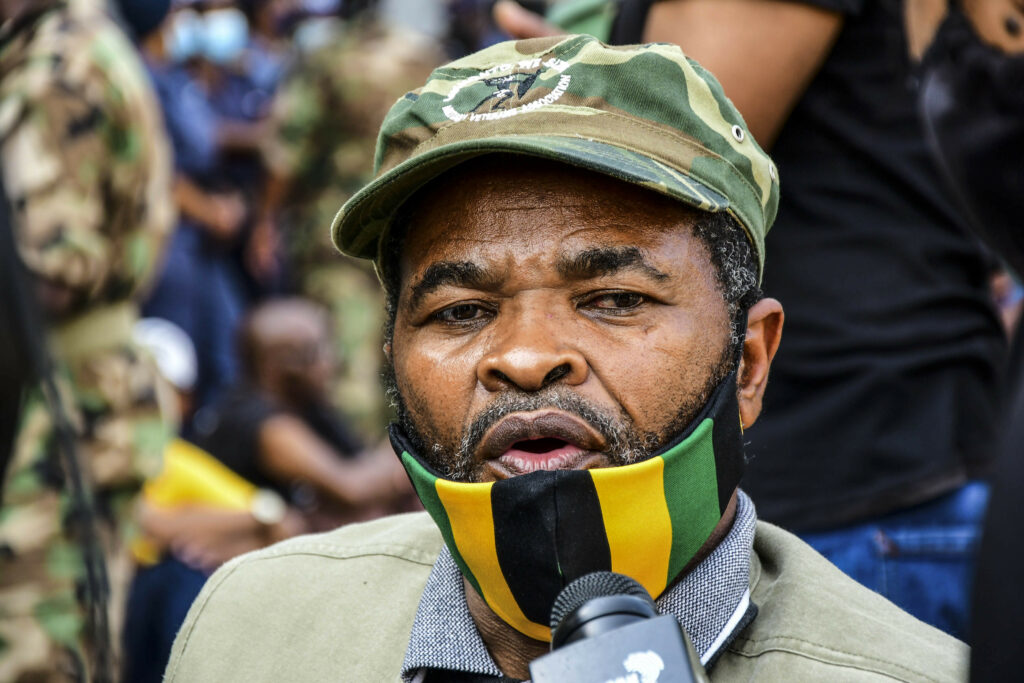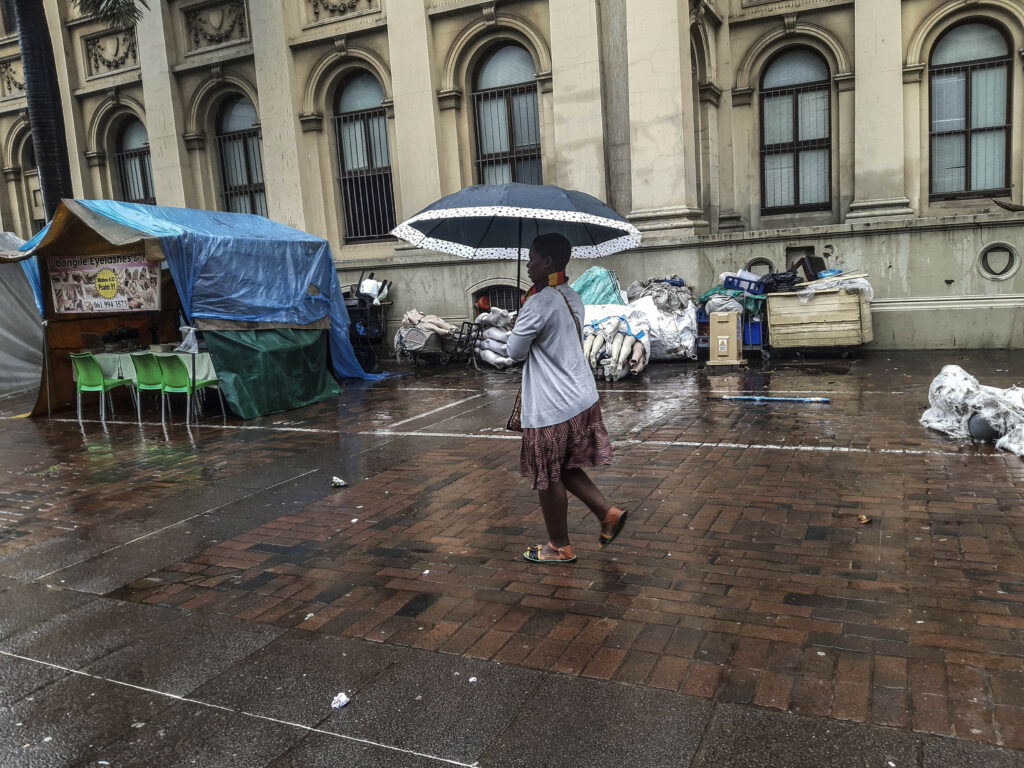Targeted: Foreign traders have not yet returned to their stalls as they are afraid of more attacks. More marches are planned in Durban in November, while traders lament that the city has taken no action yet
Foreign nationals living and working in Durban have been told to prepare for a surge in xenophobia and possible acts of violence in the lead-up to next year’s local government elections.
The executive director of the Africa Solidarity Network, Daniel Dunia, made the call this week during a meeting to address the looting of shops and attacks on foreigners that took place last week by members of the ANC’s Umkhonto weSizwe Military Veterans’ Association (MKMVA).
“Prepare yourselves. Things are going to get a lot worse, because this is political,” Dunia told the more than 100 mostly foreign traders and business people who had gathered at the Diakonia Centre in the heart of the city.
Originally from the Democratic Republic of Congo, Dunia has been in South Africa for 14 years. He runs the nonprofit Africa Solidarity Network from the University of KwaZulu-Natal’s Howard College campus.
“Politicians are going to use foreigners as scapegoats for their failures and a way to get votes next year,” he told the Mail & Guardian.
 ‘It’s political’: Zibuse Cele of the MKMVA helped organise a march through the Durban city centre, during which foreign-owned stalls at the Church Walk flea market were vandalised. (Gallo Images/Darren Stewart)
‘It’s political’: Zibuse Cele of the MKMVA helped organise a march through the Durban city centre, during which foreign-owned stalls at the Church Walk flea market were vandalised. (Gallo Images/Darren Stewart)
A group identifying as MK veterans — some dressed in military fatigues — marched through the city centre on Monday and Tuesday last week demanding that foreign-owned businesses be shut and their owners “go home”.
The group justified its actions with the ubiquitous refrain, heard in the province and nationally during xenophobic flare-ups, that foreigners were “taking jobs” from locals and were involved in drug dealing and drug trafficking.
The march soon turned violent, with several shop owners threatened or assaulted and stores looted.
However, witnesses have said, “drug users” known to frequent the city centre were the ones “mostly” responsible for the looting.
According to Smith Enabebholo, a Nigerian by birth and a naturalised citizen, foreign nationals who were in the country legally had been chased from the popular Church Walk flea market, a dozen steps from the city hall. They were yet to return to their businesses for fear of retribution.
Enabebholo is the chairperson of the market and has not been back to the venue since the march. He told the M&G that all foreign nationals trading in the area had been told to leave after the MKMVA members “hijacked” the site. Two traders had been injured while trying to protect their property, he added.
Enabebholo has been living in South Africa since 1995, when he came to the
country as a refugee. He is married to a South African woman, with whom he has children, and has deep roots in the local community. But his years as a legal citizen are not enough to appease xenophobes or opportunists.
“There are about 150 stalls in the Church Walk market, with the owners being of mixed nationality — some are local, and some are foreign, although the foreigners are here legally, they all have the required documentation and have permits to trade. They also employ local people,” he said.
The traders are on a month-to-month lease agreement, paying R514 a month.
On Thursday morning, the foreign nationals from the Church Walk market gathered at the Durban Central police station to lay charges against the MK veterans. Enabebholo had initially told the M&G that the traders believed the city should open charges as an indication that it valued the safety of small businesses and owners.
Durban-based MKMVA member Zibuse Cele, who was one of the organisers of the march, told the M&G that the “problems in the country” started with foreign nationals and that in eThekwini, the increasing number of drug-addicted street children was solely the fault of foreigners.
“We never had any of these young whoonga addicts in the 80s and 90s. The foreigners who sell the drugs are the ones who are creating these children,” he said.
“Some of the foreigners who live here are married to South African women; they do this so they can get grants. They don’t pay taxes. South Africans should come first.”
Fifty-four-year-old Cele, a clerk at a public hospital, told the M&G that the MKMVA members and others who took part in the march — such as unemployed graduates and truck drivers — were “not fighting” with foreigners.
“We are begging them to go back to their country”.
“We fought to make South Africa free, but there is no freedom now [with foreigners taking jobs and selling drugs].”
Asked if he was aware that almost all of the foreigners who were threatened last week had valid documentation, Cele answered: “There is corruption at the department of home affairs — they make ID documents illegally and sell it to foreigners.”
Cele cited an incident of such forgery that took place in Gauteng in the past to justify his statement. “Only some foreigners are here legally, and they must also go back,” he said.
When told the foreign business owners and traders at the market had not returned for a week for fear of retribution and that their incomes and those of their employees were affected, he said, “Good”.
“They must feel what we have been feeling.”
He said now that the market had been cleared of foreigners, local traders could use the space and fill their stores with “traditional” South African wares. But visits to the market this week by the M&G revealed that the once-bustling venue had been stripped down to a portion of its usual size.
Cele said the MK veterans and “other stakeholders” would be marching again on 23, 24 and 25 November, and that this time they had their sights set on the notorious Point area of Durban.
Asked if he had the metro’s consent to march, Cele said he had applied for permission and was “very sure” a permit would be issued.
Despite the tension between the ideologies of Cele, Enabebholo and Dunia, all three men agreed that the city of eThekwini had been wholly ineffective in addressing their respective needs.
“Why is the government [and the ANC] so silent on this?” asked Dunia. “If they are distancing themselves from what happened, why have no arrests been made?”
He told the M&G that the Africa Solidarity Network was willing and waiting to engage with the government, and had written to the mayor of eThekwini, the premier and various MECs, seeking meetings.
Both Dunia and Enabebholo agreed that if this route did not bear fruit, they would move to sue the city “as a last resort”.
Cele said the city was “running away” from the “problems” that come with foreigners. “They don’t want to talk to us [MK vets].”
The spokesperson for the municipality, Msawakhe Mayisela, told the M&G that metro police and security guards “have been deployed to the flea market. They will be monitoring the situation closely.”
But on visits to the market this week, the M&G saw no such visible policing or security.
Mayisela said that no city property was damaged during the march. As for the individuals who had their property damaged, he suggested they lay charges with the police.
“SAPS is aware of the intimidation experienced by the traders and has been working closely with metro police,” he said.
 Church Walk flea market. (Des Erasmus)
Church Walk flea market. (Des Erasmus)
“Engagements with the affected parties are ongoing. However, the city has stated categorically that it condemns the actions of the perpetrators and will be deploying metro police to ensure that they are not intimidated.
“The engagement with MK veterans is also ongoing as high-level political meetings were convened with ANC secretary general Ace Magashule as well as ANC provincial chairperson Mdumiseni Ntuli.
“The city has also brought on the UN and Africa Solidarity Network. The department of community safety and liaison is facilitating meetings with all interested and affected parties to bring the operations of the market to its normal position.”